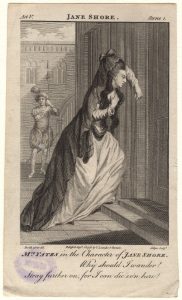“Mrs Yates is too grateful for the generous partiality with which she has long been honoured by the public, not to be under the greatest concern for the disappointment the audience met with on Saturday last, by the omission of the Epilogue to Braganza. Mrs Yates was really extremely ill, and the fatigue of having performed for ten nights almost without intermission, with the very great exertion necessary in the last scene, rendered her totally incapable.”[i]

So begins Mary Ann Yates’s letter to the public on the 6th March, 1775. In it, Yates neatly defuses a brewing public relations disaster for having left the theatre early, explaining that the mental and physical labour of acting to the level the public deserved was so draining that she was physically incapable of also speaking the comic epilogue, a task, she stresses, that had not been advertised and one that she was not contracted to undertake that night.
In this and similar public letters, Yates not only makes the case for the labour of acting,[ii] but also deploys or performs exhaustion strategically to resist overwork and unremunerated labour: her letters are less about educating the public than about getting it onside in her ongoing labour disputes with theatrical management. Her exhaustion is a badge of professionalism, but also a line that cannot be crossed. In her public letters, Yates outlines a position we’ve come to know as ASOS (Action Short Of a Strike) or working to contract.
For instance, in November 1776 she publishes a letter she wrote to her manager R.B. Sheridan reminding him of his contractual obligation to give her 24 hours’ notice of all new roles or changes to programming so that she has time to “think on the part [she] was to play.”[iii]
As it my first wish, whilst I have the honour to appear before the Public, to do all in my power to merit their approbation, I took care to have it stipulated in my articles, that I should always have twenty-four hours notice of the Character the Managers wished I should appear in; I insured myself this little notice, in order to have time to think on the part I was to play; and hoped in some sort to be the better enabled to justify the partiality that Public has honoured me with.[iv]
This letter is a response to the escalation of hostilities between Yates and the management of Drury Lane Theatre. The previous night, Sheridan had taken the unusual step of announcing to the public that Yates had refused to perform for them and was sulking instead of acting. Sheridan’s strategy in going public was to attempt to attempt to transform a dispute between theatre management and its staff into one between Yates and her audience. Yates was having none of it. Sheridan’s public appeal licensed her public response, and she not only firmly placed the blame for her non-appearance on Sheridan, who, she explained, was trebly at fault for failing to programme efficiently, failing to manage rehearsal schedules, and failing to give due notice to actors to ensure word-perfect performances. Yates then ups the ante, arguing that Sheridan’s slap-dash planning and rehearsal practices are the real insult to audiences and show a lack of respect not just to the actors he is attempting to bully, but also to the audiences who pay for the best theatre and deserve the benefit of better planning, rehearsal strategies and actors who have been given the materials to succeed. Yates reminds the public that her working conditions dictate both the pleasure and the value of their play-going experiences.
In the 1776 letters, as in 1775, Yates emphasises the work of acting; while it is received as a pleasure by audiences, creating that experience is hard, exhausting work. Yates stresses the physical and emotional toll of performing tragedy night after night. It is “a very great exertion” and causes “fatigue.” She reminds Sheridan of this in 1776, complaining that his last-minute rehearsal changes are impossible to accommodate because they don’t take necessary rest periods into account: ‘I am not sufficiently perfect to play without a rehearsal; and the only one called, was the morning after I had played Medea, when it was highly improbable I should be able to come out; and when as all my family knows, I actually kept my bed that whole day.’[i] Yates’s performances were known for the power of her voice, which soared and screamed with rage, terror and despair. Such performances were physically as well as emotionally taxing and her vocal cords needed time to recover.

Yates’s letter to the public, which frames the publication of her letter to Sheridan, goes on to stress that her work schedule includes regular periods of rest to allow her to study and to recover – the art of acting, her letters make clear, is not just her time on stage, but the time spent preparing roles and recovering from the exertions of performance. Her absence is not evidence that she’s the kind of diva who needs to be bribed to even get out of bed, but proof of how hard she has been working: it is evidence not of laziness or diminishing powers but proof of her whole body-mind commitment to excellence. Thus, her exhaustion is not a liability, but a powerful tool of resisting managerial overreach and the expectation that she perform gratitude rather than professionalism. Yates further reminds us that contractual obligations cut both ways: they not only delineate a worker’s duties, but also management’s duty to provide the time, tools and remuneration necessary to perform those duties. Yates’s successful campaigning and weaponizing of her “indisposition” led to tense relationships with a series of successive theatre managers, but not with her public, who appreciated her efforts, respected her need for rest and followed her whenever her disputes with theatrical management led her to take up a position on a new stage. Mary Ann Yates is an inspiration for us all.
References:
[i] ibid.
[i] “News.” Gazetteer and New Daily Advertiser, 6 Mar. 1775. Emphases mine.
[ii] See L. Ritchie, David Garrick and the Mediation of Celebrity pp. 106-7.
[iii] “News.” Morning Post, 9 Nov. 1776.
[iv] Ibid.
